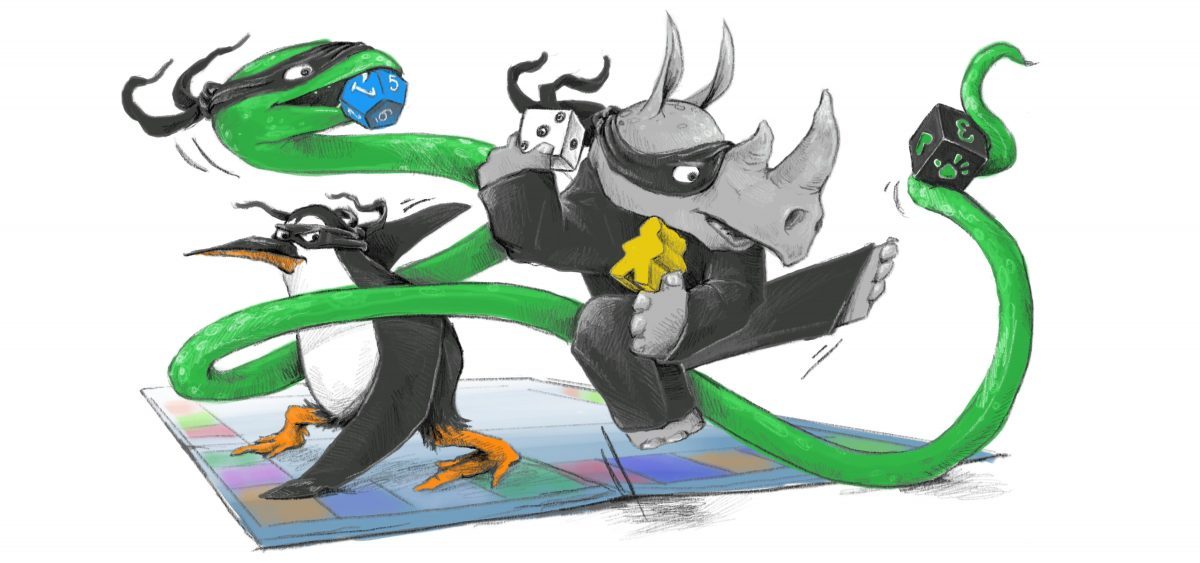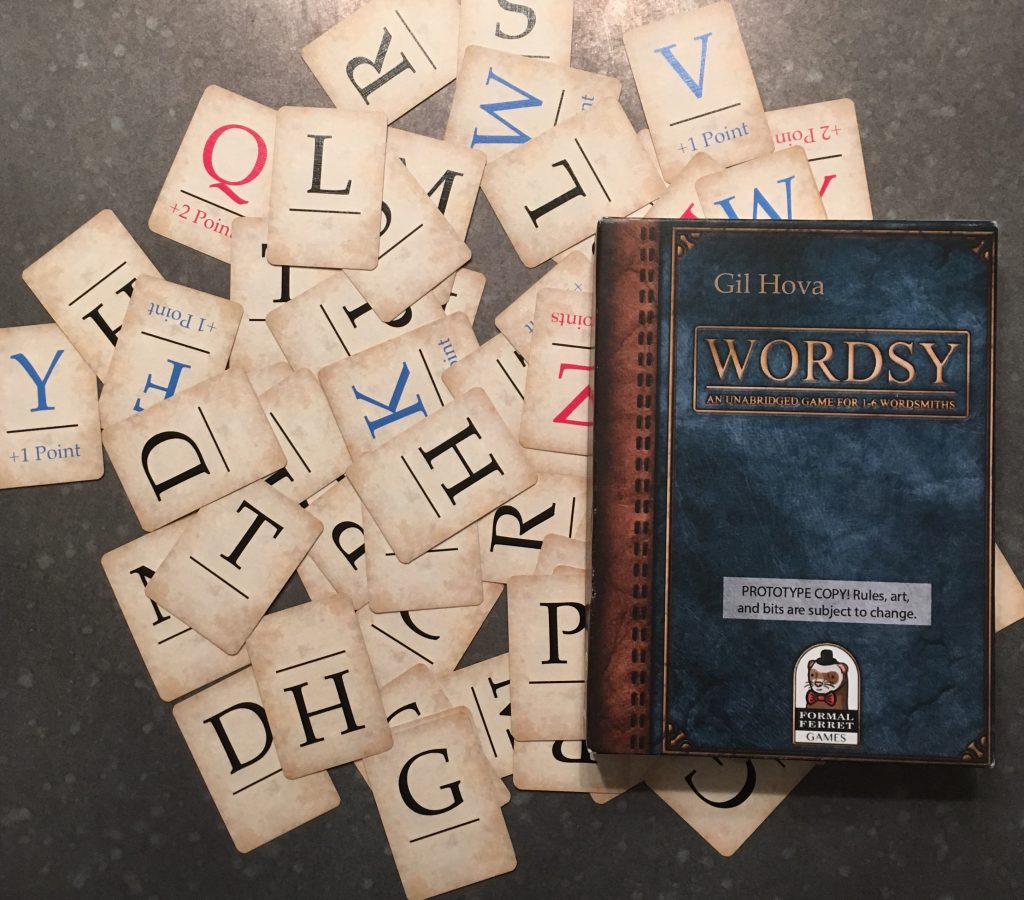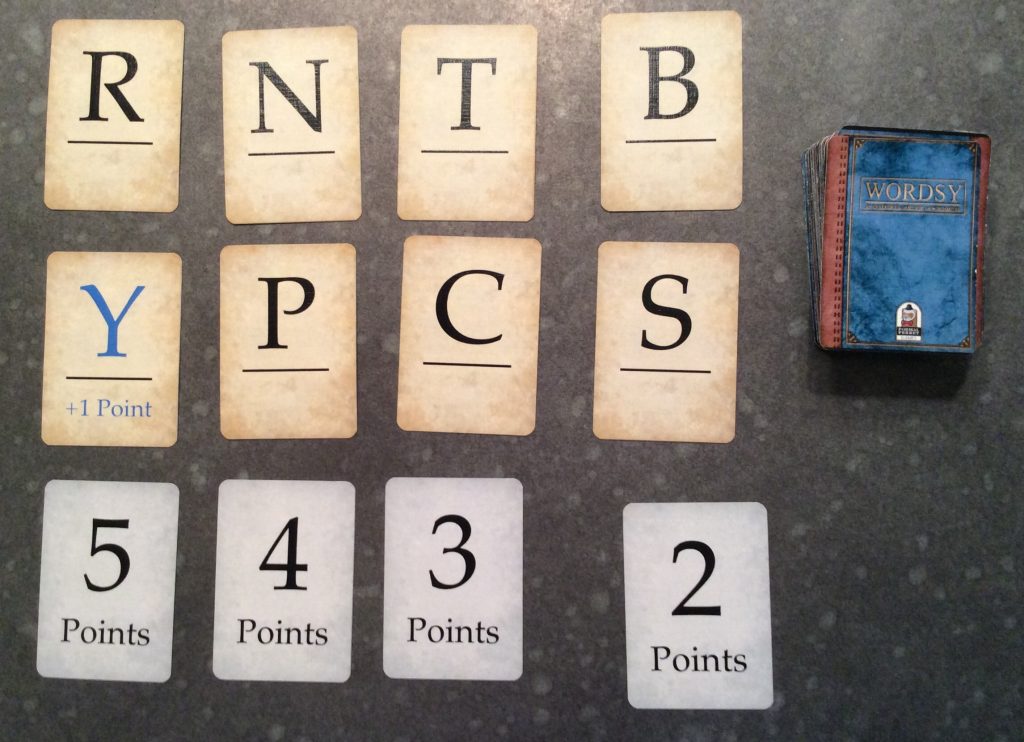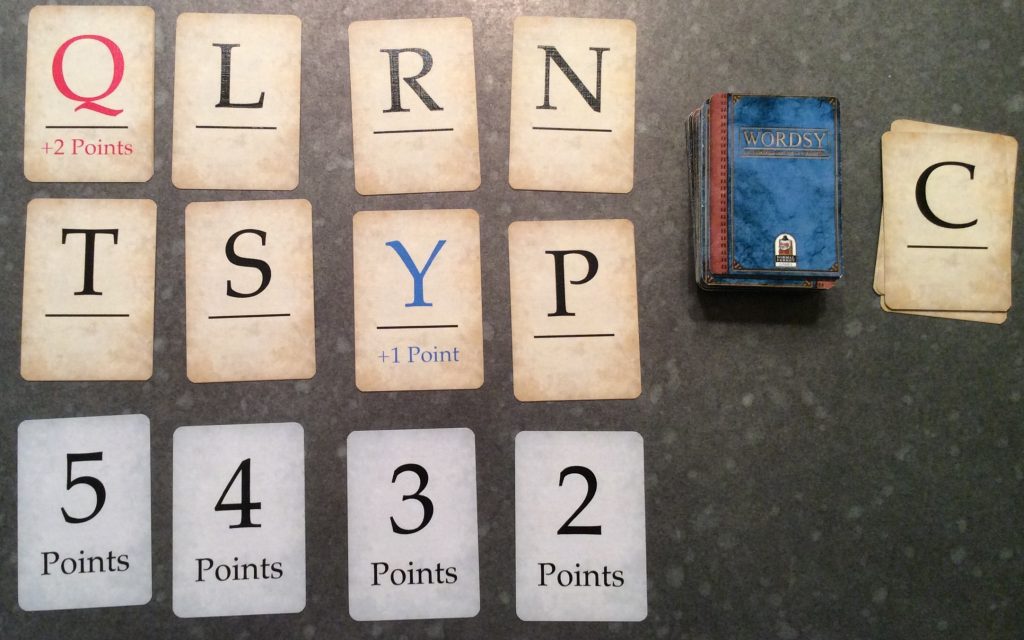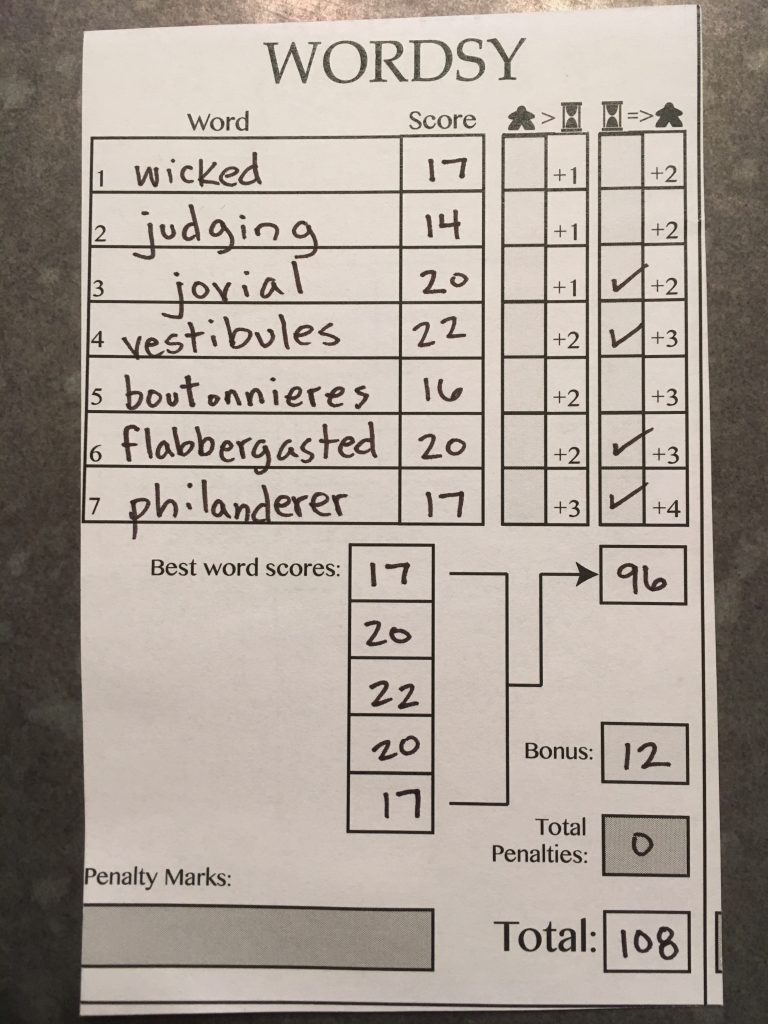This is a review of the preview version of Wordsy by Gil Hova, coming to Kickstarter soon.
“Oh no, another word game, here we go again.” or “I don’t like Scrabble, leave me alone.”
These are comments that probably haunt the dreams of every prospective word game ever thought up (games have dreams too, ya know). Not Wordsy, though, this one is different. Most – if not all – word games that I’ve ever played limit your choices, forcing you to score points based on the letters available to you, and only those. Wordsy allows you to use any letters you want, and as many letters as you want, just use some of these too.
Confused? Let me explain.
First off, Wordsy has no board. Their will be no extra points for placing a letter on a certain space, no triple word score. In fact, Wordsy is extremely portable because of this fact.
Second, Wordsy contains no vowels. That’s right, no vowels.
Third, there are no turns; everyone plays at the same time, and you only get to write down 1 word per round.
In Wordsy, you are allowed to create words as short or long as you want to, they just have to contain at least one of the letters currently showing in the playing area. In fact the more letters you can use, the better, because each letter you use scores you points. Here’s an example of how the “board” might look at the start of a round:
In this round you can spell all sorts of words: Candy (13 pts), Scrape (14 pts), Pastry (20 pts), Transportation (18 pts), Cyborgs (18 pts), Pantry (21 pts), Crypts (23 pts).
All of the above words used at least one letter; in fact, they use a lot of the letters, and so scored a bunch of points. As you can see in the example of “Transportation,” you can use as many additional letters as you want, but you only score points for the letters that are on the board, and you can only score them once. The second “t” and the second “r” do not score any points (unless there had been another “t” or “r” on the board). Additionally, using the letters to the left score more than using the ones to the right. Also there are 9 letters that add a bonus score just for using them. In the above example, using the “y” is advantageous because it is a rare letter and adds 1 bonus point to your word’s score.
So, you could’ve written down any of those words on your score pad, but choosing to score “Crypts” was best because it used all but 2 of the letters and used the rare letter also for 23 pts.
After that round is played, the letters in the 3pt and 2pt columns are discarded. The letters from the 5pt and 4pt columns slide down to the 3pt and 2pt columns and you draw 4 new letter cards to play the exit round with. So it would look like this:
Immediately I want to write down “Queasy” because it uses 2 of the rare letters worth bonus points, for a total of 15 pts. However, if you took a second to think about it, you might choose to write down “Questionably” instead for 26 pts (a fantastic score).
But remember: Everyone plays at the same time, which adds another dimension to the game. The first person to write down a word grabs the 30 second timer and flips it on their scoresheet. The rest of the players now have 30 seconds to come up with a word. You see, there is a bonus for finishing first (if your score is higher than a certain number of other players). The rest of the players now have 30 seconds to come up with a word. There is also a bonus for scoring higher than the fastest player. So, using all your time could be to your advantage if you come up with a fantastic word.
It’s a balance really, but the game handles this to a certain degree for you. In every game with more than 2 players, no one can grab the timer 2 rounds in a row, thereby assuring that someone doesn’t run away with the game.
There is also a rule called the “Two Rules of Two.” Anytime a third rare word card is added to the board or anytime there is a third card of the same letter added to the board these are immediately discarded and replaced from the draw deck. Two is fine, but no more than two. This keeps there from being words that are worth too many points and prevents a situation where it’s hard to come up with anything. Balance.
After 7 rounds of play, you throw out your 2 lowest scores (another balancing mechanic) and add the rest up, plus any bonuses. Whoever has the highest score wins. Your scoresheet might look like this:
Oh yeah, there are also penalty marks. If someone comes up with a word that you think isn’t really a word, you can challenge it. If you are right and it isn’t a word, they score zero pts for that round. If they were right, you have to mark a penalty mark on your scoresheet. For each of these at the end of the game, you subtract 2 pts.
Also you can’t use a word that was used in a previous round by someone else, or even a version of that word (plural, tense, adding a suffix).
Sounds like I keep coming up with a lot of rules, but it’s not really that many and they are incredibly intuitive.
So what do the word Ninjas think?
The Ninjas are impressed.
Ninjas, after all, are really fond of balance and this game has it to spare. You don’t have to worry about several of the problems that always plagued me when I play traditional word games like Scrabble.
First off, there is no board, so no one is going to be scoring 30 or 40 points with 2 letters just because they played them in the perfect spot.
Also you don’t have to worry about getting awful letters or 4 “i” tiles, everyone has the same. But at the same time, you are not restricted to just those letters.
This is truly an exercise in thinking outside of the board. The letters not present are just as important as the ones on the “board,” you just don’t score any points for them.
Plus if you have an awful round and can’t come up with anything at all, or score a 4, you are not out of the game. Your two lowest scores are dropped so you have the chance to redeem yourself.
The gameplay itself is fast and intense, while still managing to keep the light, casual feel that you need in a word game.
I never felt overwhelmed, but there were times that I knew my score wasn’t going to be great this round, I just had to hurry and write something before time ran out. There were also those inevitable times when I came up with a great word right after time expired, but I soon learned to keep these to myself so that I might could use them next round when some of the same letters remained on the board.
This was a preview version, so the components are not final. But the cards are already pretty great, they are a little small (think Takenoko or Seven Wonders Duel, but you get used to them. And I’m sure the scorepads will be plentiful and not crooked like my picture. It comes with a timer and is a good size for traveling. In fact, once you are used to the gameplay and scoring, you could probably just throw the cards and timer in your bag and go.
I really think that anyone who likes word games will like this one. It offers a new twist on old classics without feeling like it’s just a new version. It does reward players with a large vocabulary, but doesn’t outright punish someone for using smaller words, as long as they use a good number of the provided letters.
I don’t have a lot of word games in my collection, but I think between this one, Paperback, and Word Dominaton, I should be covered.
Ninja Approved!
